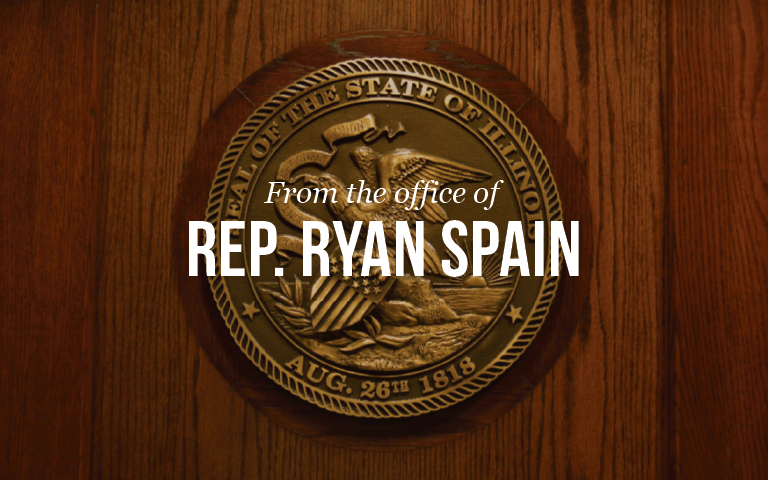December 12, 2022
BUDGET

CGFA reports on November 2022 State budget revenues. The Commission on Government Forecasting and Accountability (CGFA) released its “November 2022 Monthly Briefing” on Friday, December 2.
Inflationary pressures and rising wages continue to benefit State tax revenues. Two of Illinois’ largest revenue drivers are personal income tax payments, much of which are forwarded through paycheck deductions, and sales tax payments, which are charged as percentages of the price of the goods sold. Inflation increases these prices and pay rates, thus increasing State of Illinois income and sales tax revenues. CGFA reports that on a year-over-year basis, Illinois personal income tax receipts were up by $228 million over the comparable numbers for November 2021. Sales tax receipts were up by $134 million. These two increase, which totaled $362 million, made up by far the largest share of the overall increase of $371 million in total general revenues from state and federal sources for the thirty-day period. Many other tax and revenue cash flows rose and fell during this period, but these smaller trends tended to cancel each other out.
CRIMINAL LAW
SAFE-T Act lawsuit before circuit court on Dec. 20. The controversial SAFE-T Act, which will abolish cash bail requirements for persons charged with most criminal offenses (including violent criminal offenses), will face a constitutional challenge in Illinois district court on Tuesday, December 20. Sixty-two Illinois state’s attorneys, representing more than half of the counties in Illinois, have filed lawsuits against the controversial law. The lawsuits have been consolidated into one case that will be heard in Kankakee County circuit court.
Constitutional reasons to strike down the SAFE-T Act include the constitutional standing of cash bail, which the new Act purports to abolish; the priority explicitly granted by the Constitution to crime victims’ rights, which is infringed and ignored by various elements of the new law; the privacy rights of police officers, which are infringed or violated by provisions of the Act that allow anonymous complaints to be made against them; and other issues.
The date to hear this case, originally December 7, was moved back by thirteen days as a result of amendments to the SAFE-T Act passed by General Assembly Democrats in the post-Thanksgiving “veto session.” The amendments were included in House Bill 1095, passed in the House on Thursday, December 1 with no House Republican votes. Governor Pritzker signed the SAFE-T Act trailer bill into law on December 6. Both sides have the right to amend their briefs to reflect the provisions of the amended law. A ruling is expected on Wednesday, December 28. The new law is scheduled to go into effect on January 1, 2023.
DOWNSTATE

Illinois corn, bean harvest mostly done; winter wheat emerges. By mid-November, 94% of the field corn and 98% of the soybeans had been harvested. Some parts of Illinois, particularly in the southern half of the state, are suitable for winter wheat. Winter wheat is a field crop that is sown in early fall, emerges and becomes dormant in late fall, and then “greens up” and matures in the following spring. As of Sunday, November 27, 90% of Illinois-sown winter wheat had emerged, in line with the five-year average of 93%.
Global wheat prices have dropped back a bit, but are still relatively high in 2022-23. This is due to various factors headed by the war between Russia and Ukraine. Both nations are big winter wheat producers in peacetime, and many of the hybrid seed winter wheat genetic lineages that Illinois farmers plant today are descended from seeds brought to America from these two countries. Current Chicago prices offer more than $7.75/bushel wheat to be delivered next spring. The most recent Illinois crop report was released on Tuesday, November 29.
JOBS
October 2022 metro area unemployment numbers released. The metro area unemployment report, prepared by the Illinois Department of Employment Security (IDES) in cooperation with the Bureau of Labor Statistics, show the geographic areas within Illinois where unemployment is higher and lower. Unemployment rates are tabulated by the 14 major metropolitan areas of Illinois. Most Chicago-area and Downstate residents live in one of these 14 metro areas.
In relation to the statewide unemployment rate of 4.3%, which counts not only larger metro areas but also smaller cities and Illinois rural areas, some regions had comparatively low levels of unemployment in October 2022. Typical areas of low unemployment are regions oriented towards higher education (Bloomington-Normal, Champaign-Urbana) and regions that border on neighboring states with booming economic conditions (Davenport-Moline-Rock Island, IA-IL; St. Louis (IL-Section)).
Higher jobless rates were posted in Illinois metro areas with a traditional orientation towards manufacturing and heavy industry. High October 2022 unemployment rates were posted in Rockford (5.9%), Decatur (5.7%), Kankakee (5.3%), and Danville (5.1%). Jobless rates above 5.0% do not indicate “full employment,” and are typically seen as indicating continued recession or recovery conditions.
Unemployment insurance (UI) Trust Fund agreed bill signedinto law. The measure will improve the State’s creditworthiness by taking steps to enable the repayment of a COVID-19 pandemic-related UI Trust Fund debt of more than $1.3 billion. The money is owed by Illinois’ UI Trust Fund to the federal government, to cover moneys paid out in unemployment benefits to persons who were laid off during the height of the pandemic-related shutdown. Much of Illinois shut down in March and April of 2020, and this debt recalled those harsh months.
Since the spring of 2021, the House Republican Caucus has called repeatedly for the State to use available surplus funds to clear the debt and improve its credit standing relative to other states. Illinois has one of the lowest credit ratings of all 50 states, which serves as a burden when the State is trying to compete with other states for economic development and jobs. Although many delays took place, a bipartisan agreement finally enabled this promise to be kept. The bill also contains other measures to build a new Illinois $1.75 billion Unemployment Insurance Trust Fund balance over time. This fund, which will be kept separately from other Illinois rainy-day funds, will be available for future economic recessions.
“When we work together, stick to the process, and respect each others’ priorities we can produce great results for Illinoisans,” said Rep. Ryan Spain following his YES vote.
The December 2022 UI agreed bill was SB 1698. It was approved by the Illinois House by a vote of 95-8-2, and was signed into law this week as P.A. 102-1105.
TAXES
Chicago Tribune analyzes Chicago property tax situation. The analysis concentrates on the disproportionate burden of Chicago property taxes in certain neighborhoods rather than others. Some neighborhoods have experienced recent reassessments. Under the statewide Property Tax Code, each county has assessor officials who reassess real properties under a set schedule. As a result of population shifts during and after the 2020-21 COVID-19 pandemic, market values of Chicago-area real properties have shifted as some Chicagoans spend more of their time working from home.
The timing of these shifts has skewed Chicago’s property tax bills, and the multi-year schedule of Chicago reassessments provided by law means that some properties have assessment values that have been adjusted to partly reflect these life/work shifts, and other neighborhoods have not fully experienced the effects of this trend.
TRANSPORTATION
REAL ID deadline extended again. In the future, everyone who wants to enter a federal secured space – including the departure gates of commercial U.S. airports – will be required to have a state identification card that has been issued and printed under the strict guidelines set out by the federal REAL ID identification law. These cards are only given to people who present multiple documents at state drivers’ license offices to prove their identity. They can be easily identified by the white-star-in-gold-circle REAL ID logo printed in the upper right-hand corner. The State of Illinois has issued more than 3 million REAL ID cards to Illinois drivers and to holders of non-driver identification cards. A person does not have to drive in order to be eligible for REAL ID.
For several reasons, centering on the March 2020 outbreak of the pandemic phase of COVID-19, many Americans – including some people in Illinois – do not yet have REAL ID-compliant identification cards. In Illinois, retiring Secretary of State Jesse White has rolled over expiring Illinois drivers’ license cards several times, although as of December 2022 he has reopened all of Illinois’ drivers’ license offices and is no longer rolling over old cards. Non-REAL ID cards will, however, continue to be valid documents to enter federal secured spaces for a short additional period of time. The U.S. Department of Homeland Security has extended the REAL ID deadline for an additional two years, from May 3, 2023 to May 3, 2025.
NEW YEAR’S DAY
Fighting Illini get invited to bowl game in New Year’s Day cluster. The University of Illinois Fighting Illini football team will face Mississippi State in the ReliaQuest Bowl on Monday, January 2, 2023. Monday the 2nd will be the legal holiday used in Illinois and most other U.S. states to observe New Year’s Day, and the game will be part of the schedule of bowl games that will be played in and around the holiday.
Played in Tampa, Florida, the ReliaQuest Bowl had been previously known as the Outback Bowl. ReliaQuest, a software firm that specializes in cybersecurity coding and electronic precautions, acquired naming rights to the Tampa bowl game. The matchup pairs teams from the Big Ten and the SEC football conferences.
HOLIDAY DIAPER DRIVE

